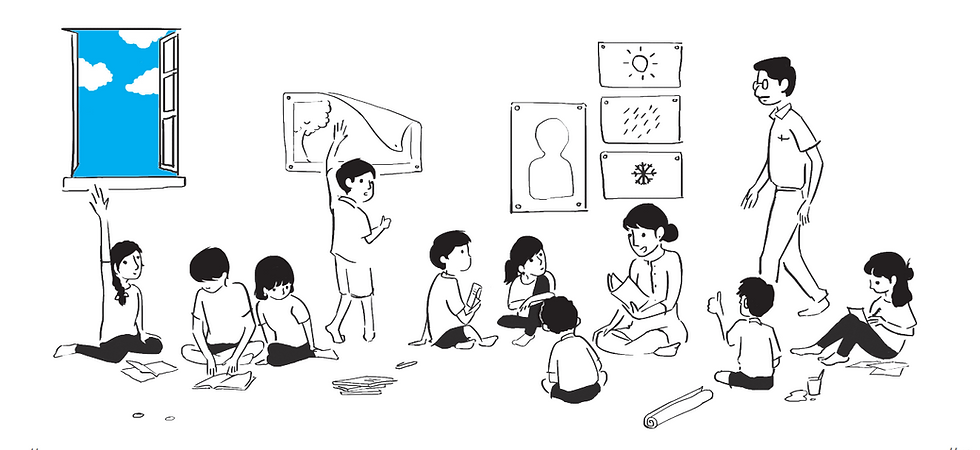Rediscovering Meaningful Learning
- asli shiksha

- Jun 18, 2023
- 3 min read
Updated: Jun 19, 2023
Traditional mainstream education often overlooks the importance of real-life learning and the cultivation of practical skills. As a result, students emerge from years of schooling resistant to anything that deviates from textbook knowledge. This uniformity of uselessness in a productive environment is a byproduct of modern schooling, affecting both urban and rural communities. Moreover, it instills a sense of inferiority in students who come from farming or skilled artisan backgrounds, leading to the erosion of livelihoods and the destruction of communities. In this blog post, we will explore an alternative pedagogical approach that emphasizes commonality and meaningful learning, as inspired by the experiences at SIDH and Bodhshala.
The Eye of Differentiation and Comparison:
When we observe the world around us, we tend to focus on differences and engage in comparisons. This mindset of differentiation leads us to negate commonness and divide things meaninglessly. Students are encouraged to differentiate and compare objects, which can result in the creation of arbitrary divisions. For instance, a child may declare a preference for one tomato over another based on personal taste, thus diminishing the common usefulness of both tomatoes.
The Eye of Commonality:
An alternative way of perceiving the world is through the eye of commonality. Rather than fixating on differences, this perspective recognizes shared attributes and behaviors among objects. For example, when we see a group of trees, we acknowledge their common characteristics such as sprouting, growing roots, shoots, leaves, flowers, and fruits. This understanding of commonality allows us to categorize objects based on shared qualities and relationships, fostering a sense of togetherness and assurance.

Sorting Seeds and Discovering Higher Commonality:
Through a simple seed sorting exercise, teachers at SIDH and Bodhshala helped students grasp the concept of commonality. By recognizing that different seeds represent grains, pulses, spices, vegetables, and fruits, the children understood that nature has already sorted them based on their common essence of nourishment for human bodies. This higher level of commonality transcends physical attributes and engages the mind in perceiving the natural order and interrelationships within the plant kingdom.
Questioning Assumptions in Education:
The exploration of commonality extends beyond the classroom. Assumptions permeate various aspects of education, such as sorting children by age and prescribing a fixed curriculum for each grade. However, these assumptions may not align with the natural progression of individual learning. By challenging these assumptions and embracing commonality, educators can create more personalized and meaningful learning experiences for students.
Counting and Mathematics:
Counting is another area where commonality plays a crucial role. When counting objects, we group them based on their shared attributes, allowing us to comprehend the concept of numbers and quantity. However, some students have been trained to focus solely on numerical signs without understanding their significance. By reintroducing the concept of commonality before delving into mathematical operations, educators can restore order and enhance comprehension.
Language and Common Nouns:
Language acquisition also benefits from recognizing commonality. When naming things in a new language, the first step is to give them common names based on shared behaviors or attributes. This concept of common nouns reflects the innate human ability to perceive the world in a unified manner. The fact that different classes arrived at the same method of naming things highlights the inherent commonality among humans' perception and understanding.
Conclusion:
Embracing the power of commonality in education can lead to more meaningful and holistic learning experiences. By shifting the focus from differentiation and comparison to recognizing shared attributes, behaviors, and relationships, students can develop a deeper understanding of the world around them. This alternative pedagogical approach fosters a sense of togetherness, encourages critical thinking, and cultivates a connection between the classroom and the real-life contexts in which students will apply their knowledge and skills. By rediscovering meaningful learning through commonality, we can empower students to become lifelong learners who are equipped to navigate and contribute to a diverse and interconnected world.




Comments